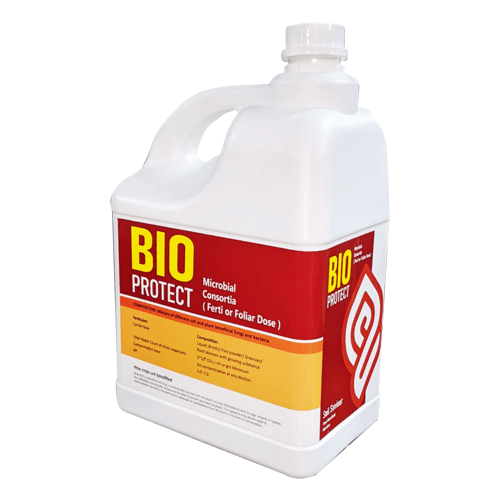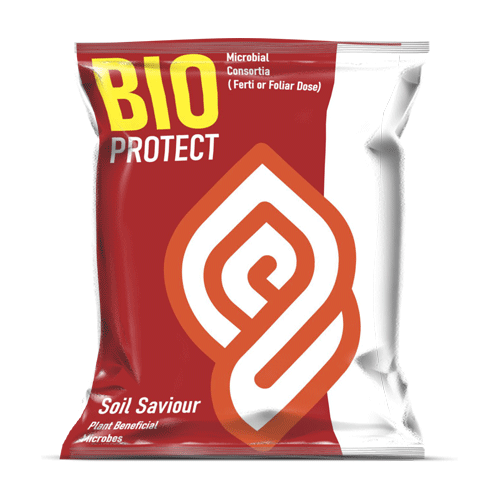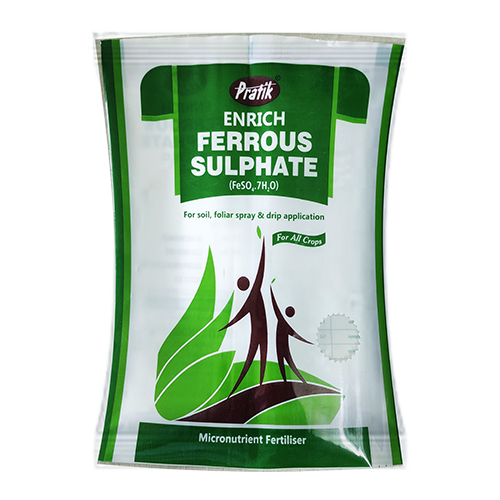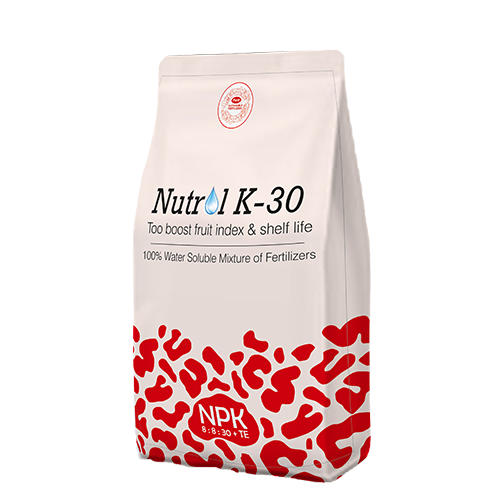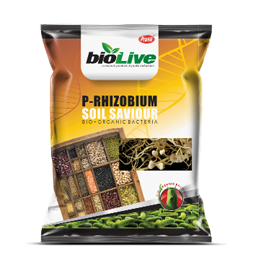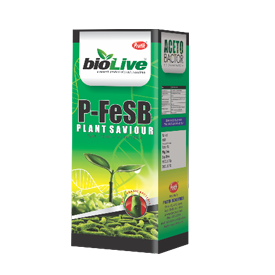- No products in the cart.
Bioprotect 1lit
Advantages :-
- It is a liquid consortia of more than seven bacteria.
- Useful for uptake of nutrients as well as protection of plants from diseases and pests.
- Reduces the environmental hazardous.
- Useful for better and healthy growth of crop
- It is a phosphate solublizing fungal biofertilizers
- Reduces the environmental hazardous.
- Useful for better and healthy growth of crop
- It is a phosphate solublizing fungal biofertilizers
Available Packaging Size :- 1lit.
Basal Dose :-
- For Spray-3-5ml per lit. of water
- For Drip – 1lit./Acre
- Seed Treatment – 25gm or ml per kg seeds.
- Useful for all crops
BioProtect 5kg
Advantages :-
- It is a talcum base consortia of more than seven bacteria.
- Useful for uptake of nutrients as well as protection of plants from diseases and pests.
- Reduces the environmental hazardous.
- Useful for better and healthy crop growth
Available Packaging Size :- 5kg.
Application Dose :-
- For Basal- Skg/Acre
- Seed Treatment- 25gm per kg seeds.
- Useful for all crops
FERROUS SULPHATE 19%
Availability:
Quick description
Ferrous Sulphate (Fe SO47H2O)
Ferrous iron (as Fe), percent by weight, minimum – 19
Free Acid (as H2SO4) percent by weight, maximum – 1
Ferric iron (as Fe) percent by weight, maximum – 0.5
Matter insoluble in water, percent by weight, maximum – 1
pH not less than – 3.5
Lead (as Pb) percent by weight, maximum – 0.003
Available packing:- 1kg & 10kg
NUTROL K-30
Elements – Composition
- Nitrogen 8%.
- Phosphorus 8%.
- Potassium 30%.
- E. (Secondary and micronutrients)
Available packing:- 1kg
Application dose:-
FOR SPRAY (3-5 gm/LITER) & DRIP (3-5kg/ACRE)
Advantages
- Boost fruit index & shelf life.
- Regulation of plant responses to light.
- Most important in Bio-chemical reaction.
- Proteins & starch synthesis.
P- Rhizobium 1kg
Type of bacteria: Symbiotic Nitrogen fixing bacteria
Type of material: Powder
Bacterial Strain: Rhizobium japonicum
Benefits:
1) Symbiotic relationship implies a signal exchange between rhizobia and legume
2) Roots of host legume plant secretes flavonoids recognized by rhizobia and later on it secretes nod factors recognized by plant causing root hair deformation and cellular processes such as ion flux
3) Bacteria penetrate between cells through crack produce by lateral emergence and intercellular infection
4) Infection triggers cell division in root cortex where a nodule appears as a result of successive processes
5) Infects central tissue and release rhizobia in cells where they differentiate morphologically into bacteroids and fix nitrogen
Recommendation:
Seed Treatment:
Take 5g/ 1 kg seed make paste in a litre water and coat seeds just before sowing
Seedling/sets treatment: Make slurry of 1 Kg in 10 ltr, water dip the roots of seedling
Nursery treatment: 500g in 50 ltr water and spread over 400 m2 nursery bed mix well with soil
Effective for crops: Soyabean, Groundnut, Moong, Chickpeas Pulses & lentils
P- Rhizobium 500gm
Type of bacteria: Symbiotic Nitrogen fixing bacteria
Type of material: Powder
Bacterial Strain: Rhizobium japonicum
Benefits:
1) Symbiotic relationship implies a signal exchange between rhizobia and legume
2) Roots of host legume plant secretes flavonoids recognized by rhizobia and later on it secretes nod factors recognized by plant causing root hair deformation and cellular processes such as ion flux
3) Bacteria penetrate between cells through crack produce by lateral emergence and intercellular infection
4) Infection triggers cell division in root cortex where a nodule appears as a result of successive processes
5) Infects central tissue and release rhizobia in cells where they differentiate morphologically into bacteroids and fix nitrogen
Recommendation:
Seed Treatment:
Take 5g/ 1 kg seed make paste in a litre water and coat seeds just before sowing
Seedling/sets treatment: Make slurry of 1 Kg in 10 ltr, water dip the roots of seedling
Nursery treatment: 500g in 50 ltr water and spread over 400 m2 nursery bed mix well with soil
Effective for crops: Soyabean, Groundnut, Moong, Chickpeas Pulses & lentils
P-FeSB 1l
Bacterial Strain: Acidithiobacillus ferrooxidans
Bacteria type: Ferrous solubilizing bacteria
Type of material: Liquid
Benefits:
1) Naturally occurring beneficial autotrophic acidophilic bacteria
2) It is perfect inoculants which increase fertility of soil and mobilize ferrous in soil
Recommendation:
Seed Treatment
Take 5ml/ 1 kg seed make paste in 5ml water and coat seeds just before sowing
Sets treatment: Make slurry of 1 lt in 10 ltr, water dip the roots of seedling and sugarcane sets before transplantation
Nursery treatment: 500 ml in 50 ltr water and spread over 400 m2 nursery bed mix well with soil
Soil treatment: Mix 1 L in 75 Kg farm yard manure broadcast over 1 acre and mix in soil
Drip treatment: Mix 1L in 200 L water and released in slowly in drip irrigation
Effective for crops: Sugarcane, Cotton, Sunflower, Capsicum, Chilli, Tomato, Pulses, Coffee,
Strawberry, Mango, Pepper, Turmeric, Ginger, Floriculture and horticulture.
P-FeSB 250ml
Bacterial Strain: Thiobacillus thioxidans
Bacteria type: Zinc solubilizing bacteria
Type of material: Liquid
Benefits:
1) Naturally occurring beneficial autotrophic acidophilic bacteria
2) It is perfect inoculants which increase fertility of soil and mobilize Zinc in soil
Recommendation
Seed Treatment
Take 5ml/ 1 kg seed make paste in 5ml water and coat seeds just before sowing
Sets treatment: Make slurry of 1 lt in 10 ltr, water dip the roots of seedling and sugarcane sets before transplantation
Nursery treatment: 500 ml in 50 ltr water and spread over 400 m2 nursery bed mix well with soil
Soil treatment: Mix 1 L in 75 Kg farm yard manure broadcast over 1 acre and mix in soil
Drip treatment: Mix 1L in 200 L water and released in slowly in drip irrigation
Effective for crops: Sugarcane, Cotton, Sunflower, Capsicum, Chilli, Tomato, Pulses, Coffee,
Strawberry, Mango, Pepper, Turmeric, Ginger, Floriculture and horticulture.

